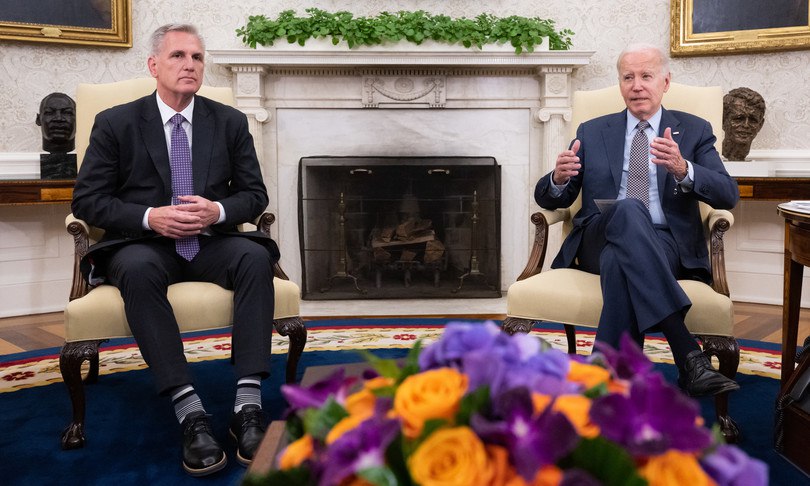Biden in a Minefield
Biden in a Minefield: According to Iran Gate, after days of negotiation and meetings, Biden and the Republicans finally reached an agreement on the debt ceiling, thereby preventing a default. In recent days, Biden had announced that he was optimistic about the negotiations and that reaching an agreement to resolve the debt crisis was very close.
On Saturday evening, following intense negotiations, it was finally agreed that the debt ceiling would be suspended for two years in exchange for halting or reducing expenditures. Now, we must await the results of the vote in Congress. The agreement on the U.S. debt ceiling was made to prevent default and to control public spending.
The debt ceiling specifies the maximum amount of money the federal government of the United States can borrow through issuing and selling government bonds. If the government cannot increase this ceiling, it will run out of money and will not be able to pay the salaries of its employees or cover social security costs.
President Joe Biden and the Republican opposition, who currently control the House of Representatives, reached a compromise late Saturday, the 27th, to suspend the debt ceiling for two years.
Negotiation Marathon
This agreement was reached after a grueling and tense negotiation marathon. Janet Yellen, the U.S. Treasury Secretary, had warned in her latest assessment that a historic default was looming for the government, and without appropriate action on the debt ceiling and reaching an agreement, American families would face severe difficulties. Additionally, a major blow would be dealt to America’s global leadership position, raising questions and doubts about America’s ability to defend its national interests.
During the time everyone was waiting for the results of the negotiations to find a solution to this crisis, financial markets showed signs of increasing anxiety as the set deadline of June 5th approached. In 2011, the mere risk of default, which was averted at the last moment, led to a downgrade of U.S. bonds and a 20% drop in the stock market.
Biden’s Important Step
In a White House statement, Biden described the agreement with Kevin McCarthy, the Republican Speaker of the House, as a fundamental step that leads to cost reduction while also protecting crucial and vital support programs for workers and contributing to economic growth.
He added that this agreement is good news for the American people because the federal government’s inability to pay its debts could have had disastrous consequences and led to an economic recession.
Biden emphasized that this agreement does not conflict with his and the Democrats’ main priorities. The President urged the House of Representatives and the Senate to approve this pact and agreement without delay.
McCarthy’s Cost Reduction
Kevin McCarthy, in a press conference at Capitol Hill, confirmed that this agreement includes a historic reduction in costs and subsequently reforms that will lift people out of poverty and reduce excessive government interventions. He emphasized that no new taxes are anticipated to increase tax revenues.
The assumption of Biden and McCarthy is that this agreement can be considered a suitable and reasonable achievement, even if some representatives from both parties do not agree with all its aspects. It is expected that Republicans and Democrats will unite to approve this agreement.
Protests
The House of Representatives is where the voting and approval of this plan seem somewhat uncertain and is expected to announce its decision this week. In recent days, opposing voices of compromise have been heard from hardline Republican representatives who demand severe cost reductions and from Democrats who reject austerity plans in social spending.
Suspension of the Debt Ceiling
As mentioned, this agreement suspends the maximum debt ceiling of the government, which is currently set at $314 trillion and has now reached this amount, for a two-year period, meaning until after the scheduled date for the 2024 U.S. presidential elections, to prevent further crises during election campaigns and at the ballot boxes. In return, it freezes federal spending and essentially prevents its increase, and in some cases, except for the increase in defense credits, it reduces it.
According to an analysis by the New York Times, the impact of the fundamental actions included in the agreement over ten years could lead to a reduction in costs equivalent to $650 billion, which is not considered a significant outcome.
From what is available so far, it can be inferred that this agreement anticipates actions such as new job requirements and time limits for some social support programs like food stamps.
Additionally, some unused anti-COVID budgets will be canceled, and ultimately, the acceleration and simplification of environmental permits for energy projects are expected. More details of the agreement’s provisions are expected to be provided in the coming days, and the full text is likely to be published.
Ultimately, it can be said that if no agreement was reached, considering the 2024 elections, a default could have been synonymous with political suicide for both conservatives and Democrats.
English
View this article in English

